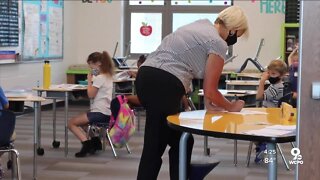Premium Only Content

Northwest Local Schools use unique program to address truancy, other issues
Although interacting with domestic animals is beneficial for all humans' physical and emotional health, it's not always practical to bring a real animal (with accompanying claws and allergenic hair) into an environment such as the Knolls of Oxford retirement community. That's why Knolls acquired three pets that don't produce dander, need food or require any cleanup. The only things their dog and two cats need are love, cuddles and an occasional change of batteries. "I thought they were cute as a button," Janyce Isaacs, a resident, said. She's owned living dogs and cats before -- mostly poodles -- and said she enjoyed the simplicity of interacting with their mechanical simulacra. "When I had the dogs, I had to take them out, feed them … I don't have to do that anymore." The robotic pets were a gift from the Scripps Gerontology Center, which partners with Knolls to research topics in gerontology -- the study of aging -- and improve the lives of its residents. According to research fellow Katy Abbott, innovations such as introducing robotic companions are part of Knolls and the Gerontology Center's commitment to preference-based living, which works to give residents a more active part in shaping their own care and lifestyle. That includes gathering information about small but important details such as when they prefer to bathe, how much decorating they would like to do in their rooms and what their favorite foods are for every meal. It can also mean introducing innovative tech such as the robotic pets. "What we're trying to do is figure out, ‘What are some novel ways of meeting people's preferences using new technology?'" Abbott said. After Ohio lawmakers passed a law to decriminalize skipping school, Northwest Local Schools are using a unique program that's gaining attention. It looks and feels a little like a courtroom, but really it's a second chance. It's a diversion program, or safe council. It's a collaborative effort between the school district, Hamilton County Juvenile Court and others to address truancy and other issues. "Referred students and parents come before me," Deanna Nadermann, the director of special projects for the county juvenile court, said. "We talk about what the barriers are. 'Why isn't the child going to school?'" Juvenile court Judge John Williams said the procedures, process, intervention and meetings are all unofficial. That means, there's no juvenile record. The young people can admit to the charge and work to resolve the issue, be it truancy or something else. Northwest Local Schools is the only district in Hamilton County currently doing this, but more districts will likely follow. "We want to work with the Cincinnati Public School System," Williams said. School administrators like Northwest Local Director of Community and Student Services Pauletta Crowley said truancy isn't the real issue. Many times, it's just a symptom of something else going on. "We do have resources that we can help them with and put things in place to help them not only deal with their child's education, but to deal with the obstacles that they're facing in life itself," she said. Officials said the program has a more-than-80 percent success rate.
-
 2:08
2:08
WCPO
1 year agoSports betting is almost legal in Kentucky
170 -
 1:45
1:45
WCPO
4 years agoNorthwest Local Schools Safety Protocols
12 -
 0:50
0:50
WFTX
4 years agoCOVID in local schools
385 -
 3:00
3:00
WTMJMilwaukee
4 years agoLocal Milwaukee Public Schools counselor starts "Adopt a Senior" program
14 -
 3:00
3:00
WSYM
4 years agoNorthwest Community Schools
25 -
 1:48
1:48
KIVI
4 years agoLocal Schools Reopening
275 -
 2:11
2:11
KIVI
4 years agoLocal program focuses on adolescent mental health
230 -
 3:00
3:00
WSYM
4 years agoNorthwest Community Schools - 4/8/20
19 -
 3:00
3:00
WSYM
4 years agoNorthwest Community Schools - 4/2/20
24 -
 3:00
3:00
WSYM
4 years agoNorthwest Community Schools - 4/29/20
8